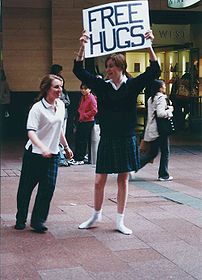"A proper community, we should remember also, is a commonwealth: a place, a resource, an economy. It answers the needs, practical as well as social and spiritual, of its members - among them the need to need one another. The answer to the present alignment of political power with wealth is the restoration of the identity of community and economy.
(pg. 63, "Racism and the Economy")"
— Wendell Berry (The Art of the Commonplace: The Agrarian Essays of Wendell Berry)
Wendell Berry is an American poet, novelist, essayist, philosopher and farmer. He was born on August 5 1934 in Henry County, Kentucky, where he still lives and farms on the family farm.
He is a strong defender of family, rural communities, and traditional family farms. He has developed these 17 rules for the healthy functioning of sustainable local communities:
1. Always ask of any proposed change or innovation: What will this do to our community? How will this affect our common wealth.
2. Always include local nature – the land, the water, the air, the native creatures – within the membership of the community.
3. Always ask how local needs might be supplied from local sources, including the mutual help of neighbors.
4. Always supply local needs first (and only then think of exporting products – first to nearby cities, then to others).
5. Understand the ultimate unsoundness of the industrial doctrine of ‘labor saving’ if that implies poor work, unemployment, or any kind of pollution or contamination.
6. Develop properly scaled value-adding industries for local products to ensure that the community does not become merely a colony of national or global economy.
7. Develop small-scale industries and businesses to support the local farm and/or forest economy.
8. Strive to supply as much of the community’s own energy as possible.
9. Strive to increase earnings (in whatever form) within the community for as long as possible before they are paid out.
10. Make sure that money paid into the local economy circulates within the community and decrease expenditures outside the community.
11. Make the community able to invest in itself by maintaining its properties, keeping itself clean (without dirtying some other place), caring for its old people, and teaching its children.
12. See that the old and young take care of one another. The young must learn from the old, not necessarily, and not always in school. There must be no institutionalised childcare and no homes for the aged. The community knows and remembers itself by the association of old and young.
13. Account for costs now conventionally hidden or externalised. Whenever possible, these must be debited against monetary income.
14. Look into the possible uses of local currency, community-funded loan programs, systems of barter, and the like.
15. Always be aware of the economic value of neighborly acts. In our time, the costs of living are greatly increased by the loss of neighborhood, which leaves people to face their calamities alone.
16. A rural community should always be acquainted and interconnected with community-minded people in nearby towns and cities.
17. A sustainable rural economy will depend on urban consumers loyal to local products. Therefore, we are talking about an economy that will always be more cooperative than competitive.





![Reblog this post [with Zemanta]](http://img.zemanta.com/reblog_e.png?x-id=a01cd44c-fdd1-4920-a6bc-d067f64a545b)

![Reblog this post [with Zemanta]](http://img.zemanta.com/reblog_e.png?x-id=7d2960fa-668a-4910-a869-04ca006aaca7)




![Reblog this post [with Zemanta]](http://img.zemanta.com/reblog_e.png?x-id=7506df7e-3251-4395-ad3a-eca1dd3064ad)

![Reblog this post [with Zemanta]](http://img.zemanta.com/reblog_e.png?x-id=759d3181-9bc4-48e4-8735-a7b0e180db79)

![Reblog this post [with Zemanta]](http://img.zemanta.com/reblog_e.png?x-id=cd307ec3-1d4f-430c-9b30-0f731b3093ce)